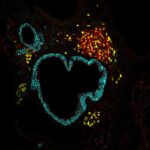
Publication: Campylobacter infection promotes IFNγ-dependent intestinal pathology via ILC3 to ILC1 conversion
Publié dans: Mucosal Immunology, 2021, 14 (3), pp.703-716. ⟨10.1038/s41385-020-00353-8⟩
Auteurs: Wayne Muraoka, Anna Korchagina, Qingqing Xia, Sergey Shein, Xi Jing, Zhao Lai, Korri Weldon, Li-Ju Wang, Yidong Chen, Lawrence Kummer, Markus Mohrs, Eric Vivier, Ekaterina Koroleva, Alexei Tumanov
Résumé
Innate lymphoid cells (ILCs) are a heterogeneous family of immune regulators that protect against mucosal pathogens but can also promote intestinal pathology. Although the plasticity between ILCs populations has been described, the role of mucosal pathogens in inducing ILC conversion leading to intestinal pathology remains unclear. Here we demonstrate that IFNγ-producing ILCs are responsible for promoting intestinal pathology in a mouse model of enterocolitis caused by Campylobacter jejuni, a common human enteric pathogen. Phenotypic analysis revealed a distinct population of IFNγ-producing NK1.1-T-bet+ILCs that accumulated in the intestine of C. jejuni-infected mice. Adoptive transfer experiments demonstrated their capacity to promote intestinal pathology. Inactivation of T-bet in NKp46+ ILCs ameliorated disease. Transcriptome analysis and cell-fate mapping experiments revealed that IFNγ-producing NK1.1-ILCs correspond to ILC1 profile and develop from RORγt+ progenitors. Collectively, we identified a distinct population of NK1.1-ex-ILC3s that promotes intestinal pathology through IFNγ production in response to C. jejuni infection.
Lien vers HAL – amu-04831548
Lien vers le DOI – 10.1038/s41385-020-00353-8

